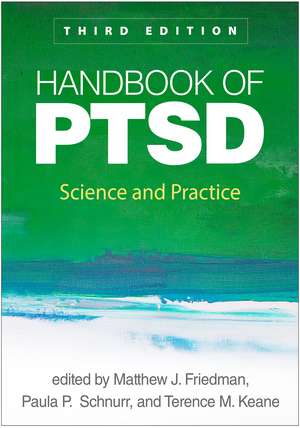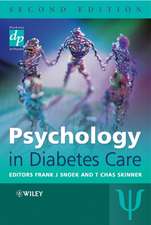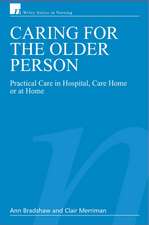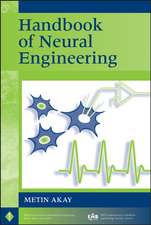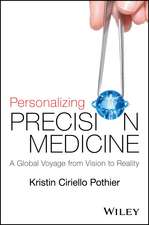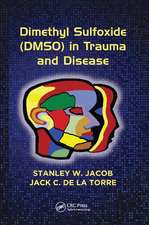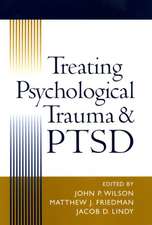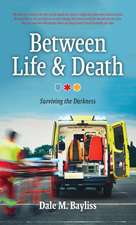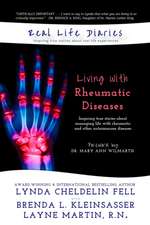Handbook of PTSD, Third Edition: Science and Practice
Autor Matthew J. Friedmanen Limba Engleză Hardback – 8 oct 2021
New to This Edition
*Thoroughly revised to reflect the accelerating pace of scientific and clinical progress; includes a range of new authors.
*Chapters on new topics: treatment of PTSD with comorbid disorders, and postmortem brain banking.
*New chapters on previously covered topics, including DSM-5 and ICD-11 diagnostic criteria, the psychoneurobiology of resilience, and challenges in implementing clinical best practices.
*New or updated discussions of such timely issues as treatment of refugees, telemental health, and technology-based interventions.
Preț: 734.46 lei
Preț vechi: 773.13 lei
-5% Nou
140.56€ • 146.20$ • 116.04£
Carte disponibilă
Livrare economică 24 martie-07 aprilie
Livrare express 07-13 martie pentru 64.50 lei
Specificații
ISBN-10: 1462547079
Pagini: 670
Dimensiuni: 178 x 254 x 40 mm
Greutate: 1.36 kg
Ediția:3rd edition
Editura: Guilford Publications
Colecția Guilford Press
Public țintă
Professional Practice & DevelopmentCuprins
1. PTSD from DSM-III to DSM-5: Progress and Challenges, Matthew J. Friedman, Paula P. Schnurr, & Terence M. Keane
2. DSM-5 Criteria for PTSD, Matthew J. Friedman, Michelle J. Bovin, & Frank W. Weathers
3. Historical Roots of the PTSD Construct: How PTSD Became a Diagnosis and Launched the Traumatic Stress Field, Alexander C. McFarlane & Dean G. Kilpatrick
II. Scientific Foundations and Theoretical Perspectives
4. Epidemiology of Trauma and PTSD in Adults, Kristina J. Korte, Tammy Jiang, Karestan C. Koenen, Sandro Galea, & Jaimie L. Gradus
5. Epidemiology of Trauma and PTSD in Childhood and Adolescence, William E. Copeland & Ellen W. McGinnis
6. Psychological Models of PTSD, Richard A. Bryant
7. Alterations in Memory and Other Neurocognitive Processes, Chris R. Brewin & Jennifer J. Vasterling
8. Trauma-Induced Dissociation, Anne P. DePrince, Martin J. Dorahy, Ruth Lanius, & Francesca L. Schiavone
9. Examining Neurocircuitry and Neuroplasticity in PTSD, Lynnette A. Averill, Christopher L. Averill, Teddy J. Akiki, & Chadi G. Abdallah
10. Neurochemistry, Neuroendocrinology, and Neuroimmunology of PTSD, Ann M. Rasmusson, Byung K. Kim, Tiffany R. Lago, Kayla Brown, Caitlin Ridgewell, & Arieh Y. Shalev
11. Genetics of PTSD, Daniel Bustamante, Kaitlin Bountress, Christina Sheerin, Karestan C. Koenen, Guia Guffanti, Lulu Yan, Michelle Haloossim, Monica Uddin, Nicole Nugent, & Ananda B. Amstadter
12. What Brain Tissue Can Tell Us: Postmortem Brain Banking and Analysis of PTSD Molecular Pathology, Matthew J. Girgenti, Bertrand R. Huber, Matthew J. Friedman, & Ronald S. Duman
13. Gender Issues in PTSD, Rachel Kimerling, Julie C. Weitlauf, & Amy E. Street
14. A Developmental Perspective on Childhood Traumatic Stress, Adam D. Brown, Emily Becker-Weidman, & Glenn N. Saxe
15. Trauma and PTSD in Older Adults, Joan Cook & Vanessa Simiola
III. Clinical Practice: Evidence-Based State of the Art
16. Assessment of PTSD and Its Comorbidities in Adults, Nicholas A. Livingston, Deborah J. Brief, Mark W. Miller, & Terence M. Keane
17. Assessment of PTSD in Children and Adolescents, Ernestine C. Briggs, Kate Nooner, & Lisa M. Amaya‑Jackson
18. Early Intervention Following Trauma, Alvi Azad, Leonard Skipper, Gary H. Wynn, & David M. Benedek
19. Psychosocial Treatments for Adults with PTSD, Tara E. Galovski, Carmen P. McLean, C. Adrian Davis, & Jennifer S. Wachen
20. Psychosocial Treatments for Children and Adolescents with PTSD, Judith A. Cohen & Anthony P. Mannarino
21. Empirically Supported Couple and Family Therapies for PTSD, Candice M. Monson, Alexandra Macdonald, Steffany J. Fredman, Jeremiah A. Schumm, & Casey Taft
22. Group Treatments for PTSD, J. Gayle Beck & Denise Sloan
23. Pharmacotherapy for PTSD, Lori Davis, Patricia Pilkinton, & Garrett Aikens
24. Treating PTSD When Common Comorbid Disorders Are Present, Sonya B. Norman, Elizabeth Straus, Robert C. Lyons, Laura D. Crocker, Peter J. Colvonen, & Jessica C. Tripp
25. Trauma Exposure, PTSD, and Physical Health, Paula P. Schnurr, Jennifer S. Wachen, Bonnie L. Green, & Stacey Kaltman
IV. Emerging Territory
26. Culture, Trauma, and Traumatic Stress among Refugees, Asylum Seekers, and Postconflict Populations, Derrick Silove & Louis Klein
27. PTSD and the Law: Forensic Considerations, Dean G. Kilpatrick, Alexander C. McFarlane, & Lucy A. Guarnera
28. Technology-Based Interventions for PTSD, Josef I. Ruzek
29. Treating PTSD Using Telemental Health Technology, Leslie A. Morland, Lisa H. Glassman, Carolyn J. Greene, Julia E. Hoffman, & Craig Rosen
30. Psychoneurobiology of Resilience, Lynnette A. Averill, Christopher L. Averill, Robert H. Pietrzak, Dennis S. Charney, & Steven M. Southwick
31. Public Mental Health Interventions Following Disasters, Joshua C. Morganstein, Holly B. Herberman Mash, Mary C. Vance, Carol S. Fullerton, & Robert J. Ursano
32. Dissemination and Implementation of Best Practices in Prevention and Treatment of PTSD, Shannon Wiltsey Stirman
33. Key Questions and an Agenda for Future Research, Matthew J. Friedman, Paula P. Schnurr, & Terence M. Keane
Recenzii
"The third edition of this handbook helps fill many clinical and research gaps and sets the stage for future research. Several important new chapters address the revised diagnostic criteria for PTSD, the establishment of a PTSD brain bank, treatment of comorbid disorders, the psychoneurobiology of resilience, and dissemination and implementation science. The volume provides excellent coverage of the most vital topics for clinicians and researchers. I would use it as a required text for our doctoral course titled Military Health Psychology."--Alan L. Peterson, PhD, ABPP, Krus Endowed Chair in Psychiatry and Director, STRONG STAR Consortium to Alleviate PTSD, The University of Texas Health Science Center at San Antonio
"Once again, the Handbook meets its lofty goal of advancing our understanding of PTSD. This volume fully updates the field and is a cornucopia of synthesis, integration, and review of the cradle-to-grave issues involving PTSD. The examination of treatments at the family and community levels is especially important, given how we have seen families and communities so affected by world events. Comprehensive and authoritative, this book should be kept within arm's reach of clinicians, researchers, and educators, and is an excellent text for a graduate course on traumatic stress.”--Stevan E. Hobfoll, PhD, ABPP, private practice, Chicago, Illinois; former Presidential Professor, Department of Behavioral Sciences, Rush University Medical Center
"A momentous addition to the literature. This third edition will serve as a critical reference for clinicians, researchers, and students by providing cutting-edge research and practical insights into the science and clinical impact of PTSD. It presents exemplary clinical approaches to keep in mind with our patients. Thank you to the authors and editors for this fantastic accomplishment!"--Kerry J. Ressler, MD, PhD, Chief Scientific Officer, McLean Hospital; Professor of Psychiatry, Harvard Medical School-
Notă biografică
Paula P. Schnurr, PhD, is cofounder and Executive Director of the National Center for PTSD and Professor of Psychiatry at the Geisel School of Medicine at Dartmouth. Dr. Schnurr is editor of the Clinician's Trauma Update Online, former editor of the Journal of Traumatic Stress, past president of the International Society for Traumatic Stress Studies, and a Fellow of the American Psychological Association and the Association for Psychological Science. With over 250 publications, she has won a number of awards for her research and contributions to the field of traumatic stress studies. Her research focuses on the treatment of PTSD and the longitudinal study of the effects of traumatic exposure on physical and mental health.
Terence M. Keane, PhD, is Director of the Behavioral Sciences Division of the National Center for PTSD, Associate Chief of Staff for Research at the VA Boston Healthcare System, and Professor of Psychiatry and Assistant Dean for Research at Boston University School of Medicine. Dr. Keane is past president of the Anxiety and Depression Association of America, the International Society for Traumatic Stress Studies (ISTSS), and the Division of Trauma Psychology (Division 56) of the American Psychological Association. Currently, he is president of the American Psychological Foundation. He is a recipient of the Lifetime Achievement Award from the ISTSS, two honorary doctorates, the John Blair Barnwell Award from the Department of Veterans Affairs, and many other awards recognizing his research and scientific contributions to the field.
Descriere
Now in an extensively revised third edition with 65% new material, this is the authoritative reference on posttraumatic stress disorder (PTSD). Contributors examine the breadth of current knowledge on the mechanisms by which stressful events can alter psychological processes, brain function, and individual behavior. Risk and protective factors across development and in specific populations are explored. Reviewing the state of the science of assessment and treatment, the volume covers early intervention and evidence-based individual, couple/family, and group therapies. Conceptual and diagnostic issues are addressed and key questions for the next generation of researchers are identified.
New to This Edition
*Thoroughly revised to reflect the accelerating pace of scientific and clinical progress; includes a range of new authors.
*Chapters on new topics: treatment of PTSD with comorbid disorders, and postmortem brain banking.
*New chapters on previously covered topics, including DSM-5 and ICD-11 diagnostic criteria, the psychoneurobiology of resilience, and challenges in implementing clinical best practices.
*New or updated discussions of such timely issues as treatment of refugees, telemental health, and technology-based interventions.
